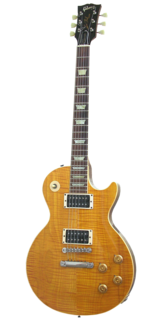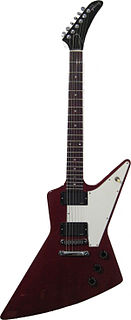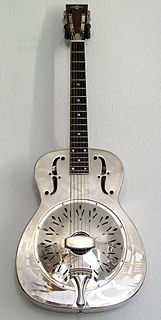External links
| Wikimedia Commons has media related to Hallmark Guitars . |
Hallmark Guitars is an American guitar manufacturer. The company was founded in 1966 by Joe Hall, formerly of Mosrite.
During its first short-lived existence, the company produced a series of guitars called the "Swept Wing," a rather "bizarre instrument," its only model. It first appeared as a semisolid-body guitar; later a solid-body model and a 12-string version were made, even a double neck. [1] The company declared bankruptcy in 1968. [2]
Hallmark Guitars was restarted by Bob Shade, a guitar builder and enthusiast from Maryland, who acquired the rights to the name from Joe Hall in the late 1990s. On an individual basis, he builds Hallmarks out of his shop in Maryland; mass-produced Hallmark SweptWings are also available. [2]
| Wikimedia Commons has media related to Hallmark Guitars . |
Ibanez is a Japanese guitar brand owned by Hoshino Gakki. Based in Nagoya, Aichi, Japan, Hoshino Gakki were one of the first Japanese musical instrument companies to gain a significant foothold in import guitar sales in the United States and Europe, as well as the first brand of guitars to mass-produce the seven-string guitar and eight-string guitar. Ibanez manufactures effects, accessories, amps, and instruments in Japan, China, Indonesia and in the United States. As of 2017 they marketed nearly 165 models of bass guitar, 130 acoustic guitars, and more than 300 electric guitars. After Gibson and fender, Ibanez is considered the third biggest guitar brand.
Rickenbacker International Corporation is a string instrument manufacturer based in Santa Ana, California. The company is credited as the first known maker of electric guitars – a steel guitar in 1932 – and today produces a range of electric guitars and basses.

C.F. Martin & Company is an American guitar manufacturer established in 1833, by Christian Frederick Martin. It is highly respected for its acoustic guitars and is a leading manufacturer of flat top guitars. The company has also made mandolins and as well as several models of electric guitars and electric basses, although none of these other instruments are currently in production.

The Gibson Les Paul is a solid body electric guitar that was first sold by the Gibson Guitar Corporation in 1954. The guitar was designed by factory manager John Hus and his team with input from and endorsement by guitarist Les Paul. Its typical design features a solid mahogany body with a carved maple top and a single cutaway, a maple set-in neck with a rosewood fretboard, two pickups with independent volume and tone controls, and a stoptail bridge, although variants exist.

Karl Höfner GmbH & Co. KG is a German manufacturer of musical instruments, with one division that manufactures guitars and basses, and another that manufactures other string instruments, such as violins, violas, cellos, double basses and bows for stringed instruments.

Paul Reed Smith Guitars, also known as PRS Guitars, is an American guitar and amplifier manufacturer located in Stevensville, Maryland. The company was founded in 1985 in Annapolis, Maryland by Paul Reed Smith.
The Ovation Guitar Company is a manufacturer of string instruments. Ovation primarily manufactures steel-string acoustic guitars and nylon-string guitars, often with pickups for electric amplification. In 2015, it became a subsidiary of Drum Workshop after being acquired from KMCMusicorp.

Mosrite is an American guitar manufacturing company, based in Bakersfield, California, from the late 1950s to the early 1990s. Founded by Semie Moseley, Mosrite guitars were played by many rock and roll and country artists.

B.C. Rich is an American brand of acoustic and electric guitars and bass guitars founded by Bernardo Chavez Rico in 1969.

The Gibson Flying V is an electric guitar model introduced by Gibson in 1958. The Flying V offered a radical, "futuristic" body design, much like its siblings: the Explorer, which was released the same year, and the Moderne, which was designed in 1957 but not released until 1982. The initial run of guitars used a distinctive wood of the Limba tree marketed by Gibson under the trade name "korina"; later models used more conventional woods.

Steinberger is a series of distinctive electric guitars and bass guitars, designed and originally manufactured by Ned Steinberger. The name "Steinberger" can be used to refer to either the instruments themselves or the company that originally produced them. Although the name has been applied to a variety of instruments, it is primarily associated with a minimalist "headless" design of electric basses and guitars.

The Gibson Explorer is a type of electric guitar that made its debut in 1958. The Explorer offered a radical, "futuristic" body design, much like its siblings: the Flying V, which was released the same year, and the Moderne, which was designed in 1957 but not released until 1982. The Explorer was the final development of a prototype design that, years later, Gibson marketed under the name Futura.

Charvel is a brand of electric guitars founded in the 1970s by Wayne Charvel in Azusa, California and originally headquartered in Glendora, California. Today, Charvel is owned by the Fender Musical Instruments Corporation.

The tenor guitar or four-string guitar is guitar variant, with four strings rather than the standard six, and with a slightly smaller body and higher-pitched sound. The instrument was initially developed in its acoustic form by Gibson and C.F. Martin during the 1920s so players of the four-string tenor banjo could double on guitar, and is also manufactured in electric forms.
A solid-body musical instrument is a string instrument such as a guitar, bass or violin built without its normal sound box and relying on an electromagnetic pickup system to directly detect the vibrations of the strings; these instruments are usually plugged into an instrument amplifier and loudspeaker to be heard. Solid-body instruments are preferred in situations where acoustic feedback may otherwise be a problem and are inherently both less expensive to build and more rugged than acoustic electric instruments.

A resonator guitar or resophonic guitar is an acoustic guitar that produces sound by conducting string vibrations through the bridge to one or more spun metal cones (resonators), instead of to the guitar's sounding board (top). Resonator guitars were originally designed to be louder than regular acoustic guitars, which were overwhelmed by horns and percussion instruments in dance orchestras. They became prized for their distinctive tone, however, and found life with bluegrass music and the blues well after electric amplification solved the problem of inadequate volume.
The Gibson Les Paul Jr. is a solid-body electric guitar introduced in 1954 as an affordable, entry-level Les Paul. It was first released with a single-cutaway body style; models with a double-cutaway body style were later introduced in 1958. The Jr. continued through the first three years of the Les Paul/SG body redesign. It was discontinued in 1963, and was not re-released until 2001.

Hallmark Cards, Inc. is a private, family-owned American company based in Kansas City, Missouri. Founded in 1910 by Joyce Hall, Hallmark is the oldest and largest manufacturer of greeting cards in the United States. In 1985, the company was awarded the National Medal of Arts.
The Fender Telecaster, colloquially known as the Tele, is the world's first mass-produced, commercially successful solid-body electric guitar. Its simple yet effective design and revolutionary sound broke ground and set trends in electric guitar manufacturing and popular music. Introduced for national distribution as the Broadcaster in the autumn of 1950 as a two-pickup version of its sister model, the single-pickup Esquire, the pair were the first guitars of their kind manufactured on a substantial scale. A trademark conflict with a rival manufacturer's led to the guitar being renamed in 1951. Initially, the Broadcaster name was simply cut off of the labels placed on the guitars and later in 1951, the final name of Telecaster was applied to the guitar to take advantage of the advent of television. The Telecaster quickly became a popular model, and has remained in continuous production since its first incarnation.
Micro-Frets is an American musical instruments manufacturing company established by Ralph Jones, in Frederick, Maryland. The company produced electric guitars and basses until its factory closed in 1975.